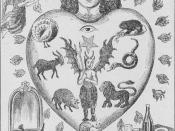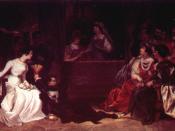The Ghost in Hamlet: Messenger of Earthly Justice
The Ghost in Hamlet is no messenger of Divine Justice but rather a messenger determined to convince Hamlet to pursue its personal justice. The Ghost's appearance is persuasive, but Hamlet is right to avoid jumping to conclusions about its demand. It is important for Hamlet to distinguish between its urgent request and what may lie beneath it. The Ghost's speeches emphasize human sins and mirror the Seven Deadly Sins of the human world. The dead king is as imperfect as Claudius, and shares in his sins. The Ghost is, therefore, human, not divine, and the revenge it seeks reflects this world, not the next.
The Ghost's request for vengeance is a problem for Hamlet. Hamlet reasons that the vision could be "an honest ghost" (I.iv.151) or it just as easily "may be the devil and the devil hath power" (II.ii.610). The Ghost directs Hamlet "to revenge, when thou shalt hear" (I.v.11).
The Ghost, yet to be identified, is already demanding vengeance! It claims to be Hamlet's "father's spirit" (I.v.13). Thus, the apparition demands Hamlet's paternal and family loyalty; "If thou didst ever thy dear father love--" (I.v.27). Such demands are not divine, but personal; God is not invoked.
King Hamlet's soul is merely an imperfect essence, "doomed for a certain term to walk the night" (I.v.14). He is in Purgatory, and is a sinner himself.
"Thus was I, sleeping, by a brother's hand
Of life, of crown, of queen, at once dispatched.
Cut off even in the blossoms of my sin,
Unhouseled, disappointed, unaneled,
No reckoning made, but sent to my account
With all my imperfections on my head" (I.v.79-84)
A messenger of heavenly justice may be a form of an angel, or religious spirit, seeking justice on God's behalf. However,


